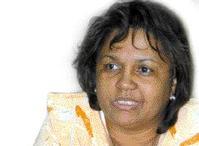
Heather Robinson
Making the decision to become a candidate for an elected position in Jamaica's general or local elections is not an easy one. Recently, one of my colleagues commented thus about someone who is now a candidate: "I didn't see her as a politician". Generally speaking, the majority of voters can itemise the characteristics that they expect to find in their representative. But what happens before this decision is made?
Many long hours are spent with family and friends in discussion about the value of such a decision. Questions are posed about the constituency development plan, campaign financing and the impact of political life on the family.
120 men and women
At present, there are some 120 men and women who have made the decision to have their names placed on ballots with the head or bell standing beside their names. These men and women are for the most part persons who have been elected or have offered themselves before. Having been chosen to be a candidate, persons must move to the next level: getting themselves known.
Those who are sitting parliamentarians are in a position to remind their constituents of their achievements, while newcomers have the difficult task of introducing themselves and telling voters of successes in their life before politics.
Some Members of Parliament will be offering themselves for between the second and the eighth time. There are therefore experienced individuals who have "been there and done that". However, in the next general election, Jamaica will have first-timers occupying the party leader role in both the People's National Party (PNP) and the Jamaica Labour Party (JLP). It will be interesting to watch how both seek to present themselves to the electorate.
Testimonials
Bruce Golding, the JLP's leader, has chosen to reintroduce himself to the Jamaican people, using testimonials from his wife and children. These family testimonials have received varied responses from some persons with whom I have spoken. One co-worker of mine said she thought the testimonial from Lorna Golding was an advertisement from a bank when she first heard it. Others have found them easy to listen to, and more interesting to watch. And some of us ask the big question: What about testimonials from the constituents of his former Central St. Catherine constituency?
The decision to use members of one's family to reintroduce a re-packaged Bruce Golding to the electorate raises some important questions. Is Bruce Golding unique in the political landscape of having the support of his family? Can endorsements from one's family remove negative views held by constituents? Can we expect to hear similar endorsements from constituents with the tag line "I am Mary Jane, Bruce Golding's constituent".
Life-shattering achievements?
What are these life-shattering achievements about which his current and former constituents will speak? Are there so many from which to choose that lots have to be drawn? And speaking about 'lots', how about having some testimonials from home owners who received their homes when Bruce Golding was the minister responsible for building houses in the '80s? Would testimonials from former officers of the National Democratic Movement, Brascoe Lee and Herro Blair, be appropriate, and why not also have testimonials from current officers Michael Williams and Peter Townsend?
Jamaica is such an interesting place to live. I can imagine what would constitute the wording of scripts for these very interesting testimonials. Perhaps we could all write one for each person.
Bruce Golding needs to remember that the ultimate testimonial will come from the voters of Jamaica, and from the voices of those who have gone on before. It is easy to turn first to those who cannot say no, but far more difficult to convince those whom you represented to declare publicly how your representation has changed their lives.
Heather Robinson is a life underwriter and former Member
of Parliament.

